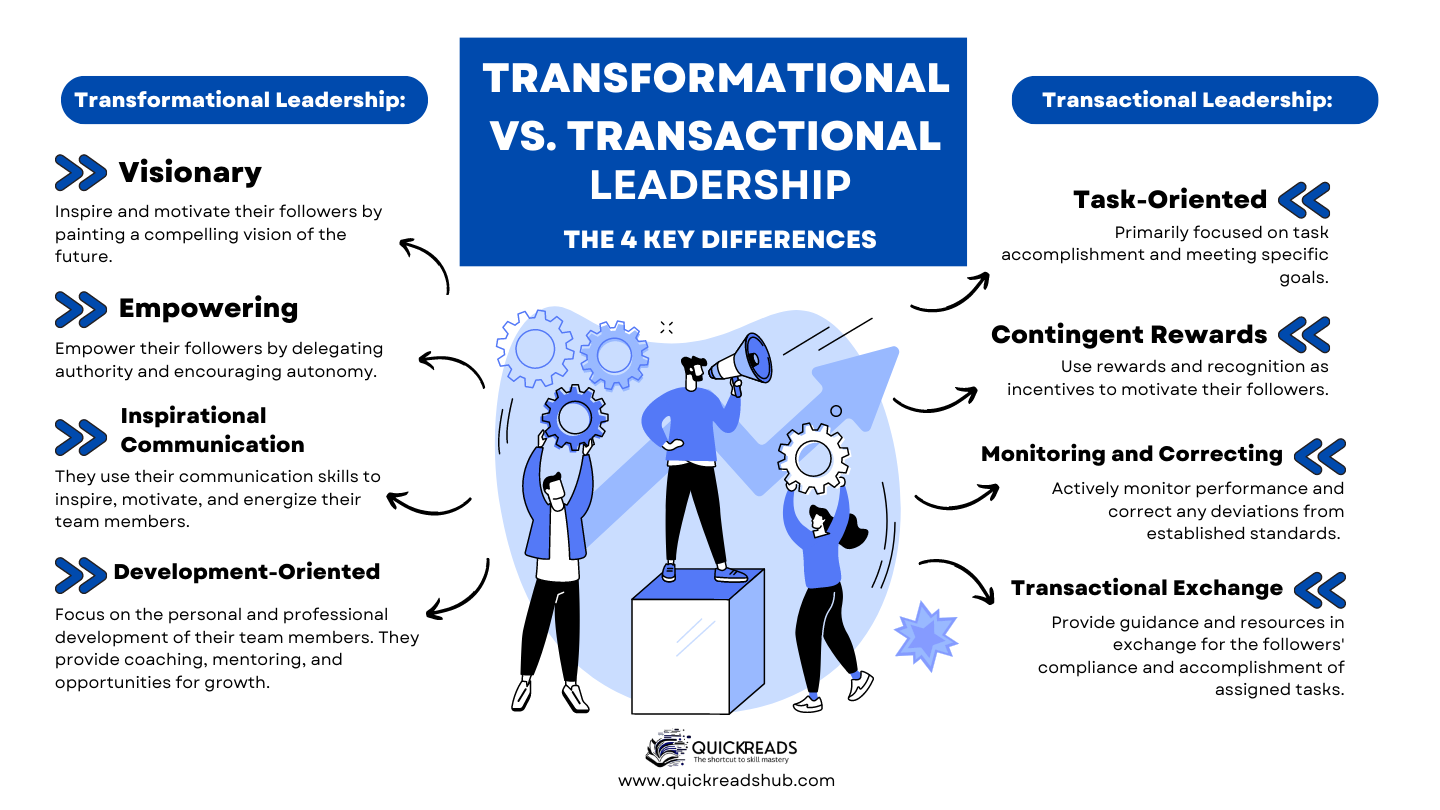Understanding Transformational Leadership: A Key to Success in Remote Work
Reflecting on my early days as a Senior Customer Success Engineer, I vividly recall the transition to remote work. The challenges seemed insurmountable, from technical glitches to communication breakdowns. Yet, amidst these hurdles, one factor stood as a beacon of hope – transformational leadership.
But what does transformational leadership mean, especially in a remote work setting? To understand this, we need to delve into the transformational leadership definition. It’s not just about managing a team; it’s about inspiring and motivating them to exceed their own self-interests for the good of the organization.
The transformational leadership theory further expands on this concept. It’s not just about leading; it’s about transforming. I remember how our leader would turn every challenge into an opportunity for growth, embodying the transformational leadership style in every action.
For instance, during a major project, our team was struggling with a technical issue. Instead of panicking, our leader saw it as a learning opportunity. He guided us through the problem-solving process, encouraging us to think outside the box. This experience not only helped us overcome the issue at hand but also equipped us with the skills to tackle similar challenges in the future.
In essence, transformational leadership in a remote work setting is about inspiring change, fostering growth, and leading with empathy and vision. It’s about turning challenges into opportunities and creating a work environment where everyone feels valued and motivated.
Defining Transformational Leadership: A New Perspective for Remote Workers
As a Senior Customer Success Engineer, I’ve seen firsthand how transformational leadership can reshape a team’s dynamics, especially in a remote work setting. But what exactly is transformational leadership?
According to BusinessDictionary.com, transformational leadership is a leadership style where the leader collaborates with team members to identify necessary changes, creates a vision to guide the change through inspiration, and executes the change alongside committed group members. This definition of transformational leadership captures the essence of leading significant change.
However, in the context of remote work, transformational leadership takes on a unique dimension. It’s not just about leading a team; it’s about leading a team scattered across various locations, possibly even different time zones.
I remember a time when our team was spread across three continents. Our leader, embodying the transformational leadership style, managed to build trust, foster collaboration, and maintain high productivity levels. He did all this while working from his home, just like the rest of us.
This experience taught me that transformational leadership in remote work isn’t just about managing tasks. It’s about inspiring change, fostering growth, and leading with empathy and vision, regardless of where you or your team are located. The transformational leadership theory, in essence, becomes a guiding light in the often challenging landscape of remote work.
The Theory Behind Transformational Leadership: Its Relevance in Remote Work
Now that we’ve defined transformational leadership, let’s delve a bit deeper into the transformational leadership theory. This theory, first introduced by James V. Downton and later developed by Bernard M. Bass, revolves around four key components: idealized influence, inspirational motivation, intellectual stimulation, and individualized consideration. The transformational leadership theory is a cornerstone in understanding how leaders can inspire, motivate, and stimulate their teams.
But why is this theory relevant to remote work?
Well, think about it. In a remote work environment, leaders don’t have the luxury of face-to-face interactions. They can’t rely on physical cues or office dynamics to lead their team. Instead, they need to inspire trust and respect through their actions and communication. They need to motivate their team members, challenge them intellectually, and consider their individual needs and circumstances.
In other words, they need to embody the principles of transformational leadership.
In the next sections, we’ll explore the transformational leadership style and how these traits can be harnessed in a remote work setting. So, are you ready to transform your leadership style and take your remote team to new heights?
The Characteristics of Transformational Leaders in a Remote Work Environment
In my experience as a Senior Customer Success Engineer, I’ve had the privilege of working under transformational leaders who truly understand the nuances of remote work. They are the ones who navigate the digital workspace with finesse, turning every Zoom call or Slack message into an opportunity to inspire and motivate.
Their leadership style is deeply rooted in the transformational leadership theory. They don’t just manage; they transform. I remember a time when our team was facing a significant challenge. Instead of being overwhelmed, our leader saw it as a chance for us to grow and learn. He communicated his vision clearly, empathized with our concerns, and adapted his strategies to suit our remote work environment.
This unique blend of vision, empathy, and adaptability is what sets transformational leaders apart. They turn challenges into opportunities for growth and learning, making a profound impact on remote work. Let’s delve deeper into the characteristics that make these leaders unique and the significant influence they wield in a remote work setting.
8 Key Traits of Transformational Leaders: What Sets Them Apart in Remote Work

Transformational leaders in remote work environments exhibit a unique set of traits that set them apart. Here are some of the key traits that make them effective:
- Inspirational Motivation: Transformational leaders have the ability to inspire and motivate their team. They create a compelling vision of the future and communicate it in a way that motivates their team to work towards it.
- Intellectual Stimulation: These leaders encourage creativity and innovation. They challenge their team members to think outside the box and encourage them to come up with new ideas and solutions.
- Idealized Influence (Charisma): Transformational leaders often have a charismatic personality that influences others. They lead by example, demonstrating the behaviors and work ethic they expect from their team.
- Individualized Consideration: Transformational leaders pay attention to the individual needs of their team members. They provide support, encouragement, and personal attention, helping each team member to reach their full potential.
- Adaptability: In a remote work setting, transformational leaders are adaptable. They are able to adjust their leadership style to suit the needs of their remote team, taking into account different time zones, cultures, and work styles.
- Communication: Effective communication is a key trait of transformational leaders. They ensure that their team members understand their roles, responsibilities, and the overall vision of the team or organization.
- Empathy: Transformational leaders show empathy towards their team members. They understand and share the feelings of their team, creating a supportive and understanding work environment.
- Visionary: These leaders have a clear vision for the future. They are able to articulate this vision to their team and inspire them to work towards achieving it.
The Impact of Transformational Leadership Style on Remote Work
The transformational leadership style has a profound impact on remote work. It goes beyond managing tasks and focuses on inspiring team members to achieve their full potential. This style of leadership is all about fostering a positive and empowering work culture, which is especially important in a remote work setting.
Transformational leaders inspire their teams by painting a clear and compelling vision of the future. They challenge their team members to think outside the box and encourage them to come up with innovative solutions to problems. This not only leads to better business outcomes but also helps employees feel more engaged and satisfied with their work.
Moreover, transformational leaders build trust with their teams by being transparent and authentic. They communicate openly with their team members, listen to their concerns, and are always ready to provide support and guidance. This helps to build a strong sense of community and belonging among remote workers, which can significantly boost their morale and productivity.
The transformational leadership style plays a crucial role in the success of remote work. It fosters a culture of innovation, collaboration, and ownership, which are key to navigating the challenges of remote work.
Transformational Leadership vs. Transactional Leadership in Remote Work
In the world of leadership, two styles often come to the forefront – transformational and transactional. Each has its unique strengths and applications, especially in a remote work context. But what sets them apart? And when is one more effective than the other? Let’s delve into these questions.

Differences and Similarities: What Works Best for Remote Teams
Transformational and transactional leadership styles are like two sides of a coin, each with its unique characteristics.
Transactional leaders, as the name suggests, operate on a transaction basis. They set clear expectations and use rewards or penalties to motivate their teams. This style can be effective in situations where tasks are repetitive, and the goals are short-term. However, it may limit innovation and long-term growth.
On the other hand, transformational leaders inspire their teams with a compelling vision of the future. They encourage innovation, personal growth, and a sense of community. This style can be highly effective in remote work environments where flexibility, adaptability, and long-term thinking are crucial.
While these styles seem different, they share a common goal – to motivate the team and achieve organizational objectives. The key is to understand when to use which style.
Situational Applications of Each Leadership Style in a Remote Work Context
In a remote work context, transactional leadership can be effective when there’s a need for structure and clear expectations. For instance, if you’re managing a remote customer service team where the tasks are clearly defined, a transactional approach can help maintain efficiency.
Transformational leadership, however, shines in situations that require innovation and adaptability. If you’re leading a remote software development team working on a new product, a transformational approach can foster creativity, encourage problem-solving, and keep the team motivated towards the shared vision.
Remember, the best leaders are those who can adapt their style to the situation and the needs of their team.
The Role of Transformational Leadership in IT and Remote Work
The rapid shift to remote work has necessitated a change in leadership styles, with transformational leadership emerging as a highly effective approach in the IT sector. Transformational leadership, first introduced in 1973, focuses on changing existing thoughts and methods for better results. It is associated with building empathetic and trustful relationships, encouraging employees to think outside the box and find unconventional solutions.
The Importance of Transformational Leadership in IT for Remote Workers
In the realm of IT, where innovation and adaptability are key, transformational leadership plays a crucial role. This leadership style promotes a collaborative environment, making every team member feel valued without over-control. It stands in contrast to transactional leadership, which values order and hierarchy.
Transformational leaders are known for their effective communication and strong vision. They know where to take the team and how to get there. They inspire their team members, reinforcing the importance of each individual’s role. Through coaching and mentoring, they empower their team members, fostering a culture of continuous learning and growth.
Moreover, transformational leadership is particularly effective in remote work settings. A study by Walden University found that remote employees perceive transformational leaders as more effective. This leadership style is adept at defining goals and milestones, developing a participative mindset, arranging customized check-ins, allowing for self-direction, and setting norms.
Real-Life Examples of Transformational Leadership in IT and Remote Work
One of the most prominent examples of transformational leadership in IT and remote work is Jeff Bezos of Amazon. During the Covid-19 pandemic, Bezos demonstrated visionary leadership, inspiring and motivating his team to adapt to the changing scenarios. His effective communication skills and empathy towards employee needs played a significant role in maintaining productivity and job satisfaction among remote workers.
Another example is the leadership at IBM. The company’s leaders have shown authenticity and empathy in managing their remote teams, building genuine relationships and maintaining regular social time to counteract the task-focus of the digital work environment. This approach has helped to build trust and reduce the distance between leaders and employees, fostering a more inclusive culture.
In conclusion, transformational leadership plays a pivotal role in IT and remote work. It fosters a culture of innovation, collaboration, and continuous learning, which are essential for the success of remote teams. As the world continues to embrace remote work, the importance of transformational leadership in IT will only continue to grow.
How to Become a Transformational Leader in a Remote Work Environment
Transformational leadership is a proactive leadership style that encourages the motivation and positive development of followers. It is a model that inspires workers to embrace change, and fosters a company culture of accountability, ownership, and workplace autonomy. In a remote work environment, transformational leadership becomes even more crucial as it bridges the gap of physical distance with strong communication, trust, and a shared vision.
Essential Skills for Transformational Leadership in Remote Work
- Openness to New Thinking: Transformational leaders in remote work environments must be open to new ideas and ways of working. They should be willing to embrace advanced tools and technologies that facilitate remote work and collaboration.
- Ability to Inspire Participation: A transformational leader should be able to inspire their team members to participate actively in tasks and projects. This involves creating an environment where employees feel valued and their ideas are appreciated.
- Commitment to Active Listening: Active listening is a crucial skill for transformational leaders. It involves understanding and responding to the thoughts and ideas of team members, fostering an environment of trust and respect.
- Tolerance for Intelligent Risks: Transformational leaders are not afraid to take risks. They understand that innovation often involves stepping out of the comfort zone and trying new strategies.
- Trust in Team Members: Trust is a fundamental component of transformational leadership. Leaders should trust their team members and give them the autonomy to make decisions and take ownership of tasks.
Training and Certification for Aspiring Transformational Leaders in Remote Work
For those aspiring to be transformational leaders in a remote work environment, there are numerous training and certification programs available. These programs provide extensive knowledge and practical skills necessary to be a successful transformational leader. Institutions like Georgetown University School of Continuing Studies, University of Notre Dame, and University of Washington offer specialized programs in transformational leadership. Online platforms like Coursera and Udemy also offer courses that can be taken at your own pace.
Becoming a transformational leader in a remote work environment involves developing a specific set of skills and characteristics. It requires a commitment to continuous learning and adaptation to the changing dynamics of the workplace. With the right mindset and training, anyone can become a successful transformational leader and drive their team towards success.
Criticisms of Transformational Leadership in Remote Work
As with any leadership style, transformational leadership is not without its criticisms. While it has proven to be effective in many remote work scenarios, it’s essential to consider the potential drawbacks and counterarguments.
Common Critiques of Transformational Leadership in a Remote Work Context and Counterarguments
One common critique of transformational leadership is that it can lead to over-dependence on the leader. In a remote work context, where face-to-face interactions are limited, this over-dependence can become problematic. Employees might feel lost without constant guidance from their leader, hindering their ability to work independently. However, a counterargument to this is that transformational leaders inspire self-confidence and autonomy in their followers. They empower their team members, fostering a sense of independence rather than dependence.
Another criticism is that transformational leadership can blur the line between professional and personal boundaries. Transformational leaders often form close relationships with their team members, which can lead to issues in a remote work context where maintaining professional boundaries is crucial. However, transformational leaders are known for their high emotional intelligence. They are capable of forming close yet professional relationships with their team members, ensuring that boundaries are respected.
Lastly, some argue that transformational leadership can be time-consuming. Transformational leaders invest significant time and effort in mentoring their followers, which can be challenging in a remote work context where communication can be more complex. However, with the right tools and strategies, transformational leaders can effectively mentor their team members remotely. They can leverage various digital communication tools to provide guidance and support to their followers.
While there are valid criticisms of transformational leadership in a remote work context, there are also compelling counterarguments. It’s crucial to consider these factors and adapt the leadership style as necessary to fit the unique demands of remote work.
Further Reading
If you’re interested in diving deeper into the world of transformational leadership, here are some recommended books that can provide further insights and knowledge.
- “Transformational Leadership: Creating Organizations of Meaning” by Stephen Hacker and Tammy Roberts – This book offers a comprehensive overview of transformational leadership and provides practical guidance on how to create organizations of meaning.
- “Leadership: Theory and Practice” by Peter G. Northouse – A staple in leadership education, this book explores a wide range of leadership theories, including transformational leadership, with case studies and self-assessment questionnaires.
- “Transformational Leadership: A Blueprint for Real Organizational Change” by Randy Dobbs – Dobbs shares his own experiences with transformational leadership and offers a blueprint for real organizational change.
- “Leading the Transformation: Applying Agile and DevOps Principles at Scale” by Gary Gruver and Tommy Mouser – A must-read for IT professionals, this book shows how transformational leadership principles can be applied in Agile and DevOps environments.
Related Posts:
- What is Empathy in Leadership? Unlocking the Power of Emotional Intelligence
- Managing Remote Employees: Best Exclusive Guide
- 8 Essential Tools for Managing Remote Employees
- Managing Remote Teams Best Practices For Surprising Success
- Remote Leadership: Easily Know It All Ultimate Guide
- Remote Leadership Communication: 5 Ways To Improve and Apply
Remember, learning is a continuous journey. These books can provide valuable insights and deepen your understanding of transformational leadership, especially in the context of remote work. Happy reading!
Conclusion: The Future of Transformational Leadership in Remote Work
As we look ahead, the future of transformational leadership in remote work is not just promising, but essential. The digital age has ushered in a new era of work, one where the traditional office is being replaced by virtual workspaces. This shift has brought about a need for leaders who can navigate this new landscape effectively.
The evolving role of transformational leadership in remote work is becoming more apparent. As remote work continues to grow, so does the need for leaders who can inspire and motivate their teams from afar. Transformational leaders are at the forefront of this change, guiding their teams through the challenges of remote work and fostering a culture of innovation and adaptability.
In the world of IT, for example, transformational leadership has been instrumental in driving change and innovation. Leaders in this field have been able to leverage their transformational leadership skills to inspire their teams, drive innovation, and navigate the complexities of remote work. This has resulted in increased productivity, improved team dynamics, and a stronger sense of community within remote teams.
But what does the future hold for transformational leadership in remote work? As we move forward, we can expect to see an increased emphasis on the traits that define transformational leaders. Traits such as empathy, flexibility, and the ability to inspire will become even more important as teams continue to work remotely.
Moreover, as organizations continue to navigate the challenges of remote work, transformational leaders will play a crucial role in ensuring the success of their teams. They will be the ones to guide their teams through the challenges of remote work, foster a culture of innovation and adaptability, and drive their organizations forward in the face of change.
The future of transformational leadership in remote work is bright. As we continue to navigate the complexities of the digital age, transformational leaders will be at the forefront, guiding their teams through the challenges and opportunities that lie ahead. As a modern remote worker, embracing the principles of transformational leadership can help you navigate your own path in the world of remote work.





